Table of Contents
Complex prepositions are phrases made up of two or more words that provide precise details about position, time, cause, and relationship between elements in a sentence. Unlike simple prepositions, they give extra clarity, making sentences more descriptive and easier to understand.
Common examples include in front of, due to, and on behalf of. Mastering complex prepositions enhances both writing and speaking, helping to convey ideas with accuracy and depth.
What Are Complex Prepositions?
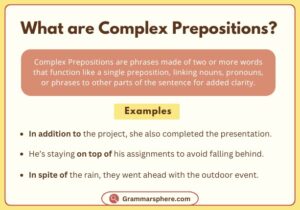
Complex Prepositions are phrases made of two or more words that function like a single preposition, linking nouns, pronouns, or phrases to other parts of the sentence for added clarity.
Examples :
In addition to the project, she also completed the presentation.
He’s staying on top of his assignments to avoid falling behind.
In spite of the rain, they went ahead with the outdoor event.
Types of Complex Prepositions
There are three main types of complex prepositions. These are:
- Prepositional Phrases with Two or More Words
- Prepositions with Nouns and Modifiers
- Prepositions with Adjectives or Adverbs
1. Prepositional Phrases with Two or More Words
These are complex prepositions formed by combining multiple words, such as a preposition plus a noun or an adjective.
Example Sentences:
- In front of: The car is parked in front of the house.
- Out of: She jumped out of the window.
- On behalf of: He spoke on behalf of the team.
- In spite of: They continued the game in spite of the rain.
Example Words:
- in front of
- on top of
- next to
- Out of
- on behalf of
- in spite of
- with respect to
- in view of
- as for
- on account of
- by means of
- with regard to
- in case of
- apart from
- by virtue of
- in light of
- in line with
- with reference to
2. Prepositions with Nouns and Modifiers
This type involves a complex preposition that includes a noun and its modifier (usually an adjective).
Example Sentences:
- In addition to: She is talented in addition to being hardworking.
- In front of: They stood in front of the door.
- In case of: Please contact me in case of any emergency.
Example Words:
- in addition to
- in front of
- in case of
- in charge of
- in the middle of
- in connection with
- in favor of
- in honor of
- in search of
- for the sake of
- in need of
- in opposition to
- at the expense of
- at the mercy of
- in accordance with
- in response to
3. Prepositions with Adjectives or Adverbs
This type combines adjectives or adverbs with a preposition. These combinations form more specific complex prepositions.
Example Sentences:
- Due to: The match was cancelled due to bad weather.
- According to: According to the report, the project was successful.
- Because of: The game was postponed because of the rain.
Example Words:
- due to
- according to
- because of
- prior to
- contrary to
- subsequent to
- similar to
- far from
- different from
- opposed to
- consistent with
- regardless of
- dependent on
- relative to
- akin to
- essential to
- comparable to
Usage of Complex Prepositions
Complex prepositions are used to add detail or clarify relationships in sentences. They consist of two or more words working together to form a single meaning, helping to explain position, reason, time, or relationship. Let’s discuss their usage with examples.
1. Complex Prepositions Showing Position
These prepositions indicate where something is located in relation to something else. They add clarity about the location or placement of an object or person.
Example Sentences:
- in front of: The sign is in front of the building.
- next to: She sits next to her friend.
- on top of: Place the book on top of the shelf.
- in the middle of: We parked in the middle of the lot.
- beside: He stood beside the car.
- underneath: The keys are underneath the table.
2. Complex Prepositions Showing Cause or Reason
These prepositions are used to explain why something happens, providing the cause or reason behind an action or situation.
Example Sentences:
- because of: The meeting was postponed because of the weather.
- due to: She was absent due to illness.
- on account of: The event was cancelled on account of rain.
- in view of: In view of recent events, changes were made.
- for the sake of: He works hard for the sake of his family.
- owing to: The flight was delayed owing to fog.
3. Complex Prepositions Showing Time
These prepositions are used to indicate when something happens. They help to establish the timing of events in relation to each other.
Example Sentences:
- prior to: He called prior to the meeting.
- in the course of: In the course of the week, we will discuss the project.
- at the time of: She was at home at the time of the incident.
- during: She rested during the afternoon.
- in the middle of: The call came in the middle of the night.
- subsequent to: The meeting was scheduled subsequent to lunch.
4. Complex Prepositions Showing Relationship or Comparison
These prepositions compare or link two things to show their relationship or similarity. They clarify how one thing relates to another.
Example Sentences:
- according to: According to the report, sales are up.
- in relation to: This decision was made in relation to market trends.
- in comparison with: His results were good in comparison with others.
- in contrast to: Her style is simple in contrast to his.
- similar to: The new phone is similar to the older model.
- different from: His approach is different from mine.
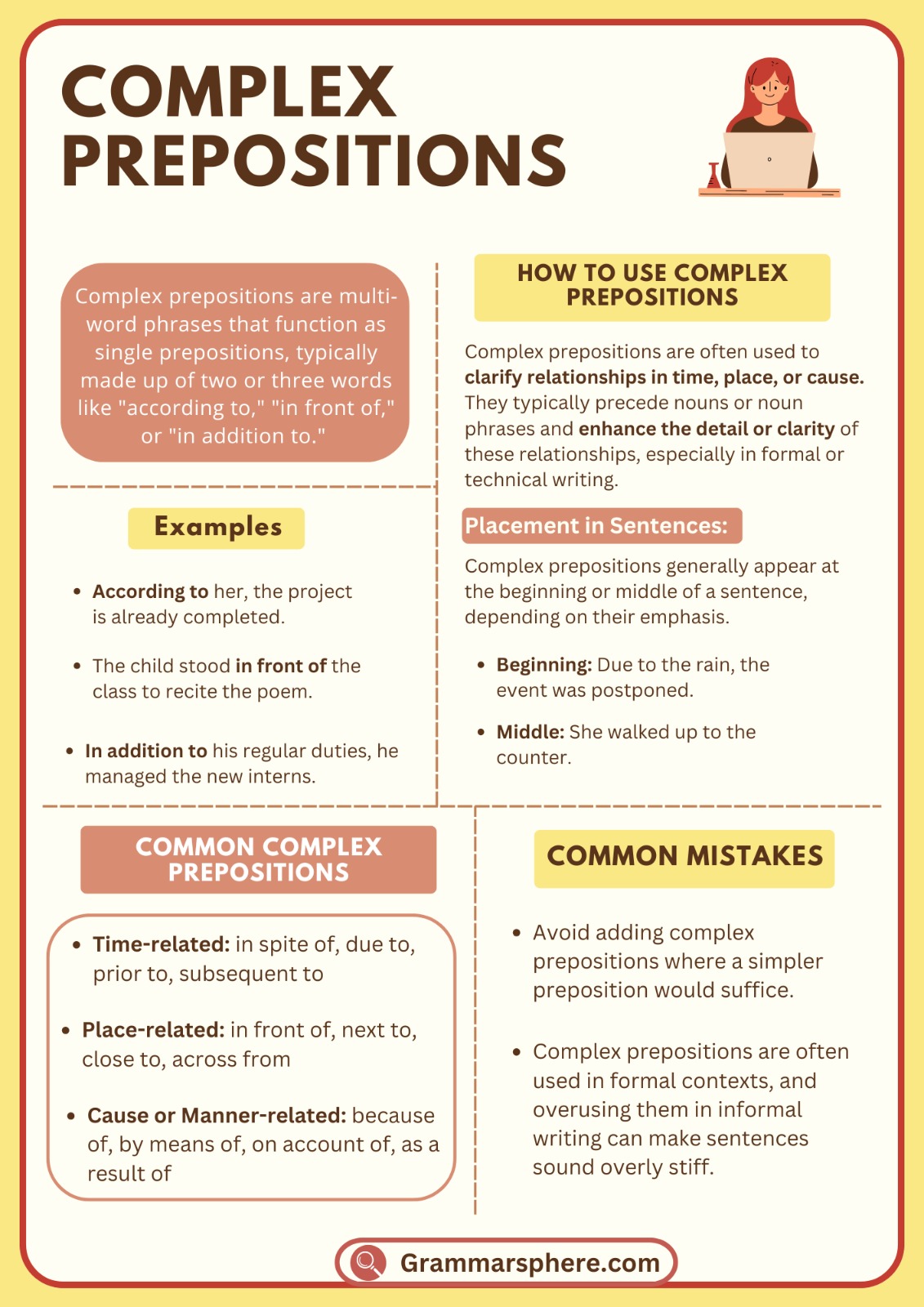
Simple vs. Complex Prepositions
1۔ Simple Prepositions
Simple prepositions consist of one word and are generally used to show basic relationships in terms of place, time, direction, or position. They are straightforward and often easier to use because they convey a clear and concise relationship.
- in: The book is in the bag.
- on: She placed the vase on the table.
- at: They will meet at noon.
- under: The cat is hiding under the bed.
- near: The school is near the park.
- by: He stood by the window.
2۔ Complex Prepositions
Complex prepositions consist of two or more words working together to create a single prepositional phrase. They are used when you need to provide more detail or a clearer relationship between two things, especially in terms of position, cause, time, or comparison.
- in front of: The car is parked in front of the house.
- because of: They cancelled the picnic because of the rain.
- in addition to: She excels in addition to being dedicated.
- according to: The report was prepared according to guidelines.
- in the middle of: The announcement came in the middle of the event.
- on behalf of: He spoke on behalf of the group.
Complex Prepositions List
- in front of
- in addition to
- because of
- due to
- in spite of
- on account of
- on top of
- in case of
- with regard to
- in line with
- in relation to
- in accordance with
- in response to
- in contrast to
- in light of
- with respect to
- by means of
- for the sake of
- in the course of
- on behalf of
- in favor of
- in connection with
- in search of
- with the exception of
- at the expense of
- at the mercy of
- apart from
- in charge of
- in place of
- prior to
- subsequent to
- up to
- as for
- as well as
- similar to
- contrary to
- regardless of
You May Also Like

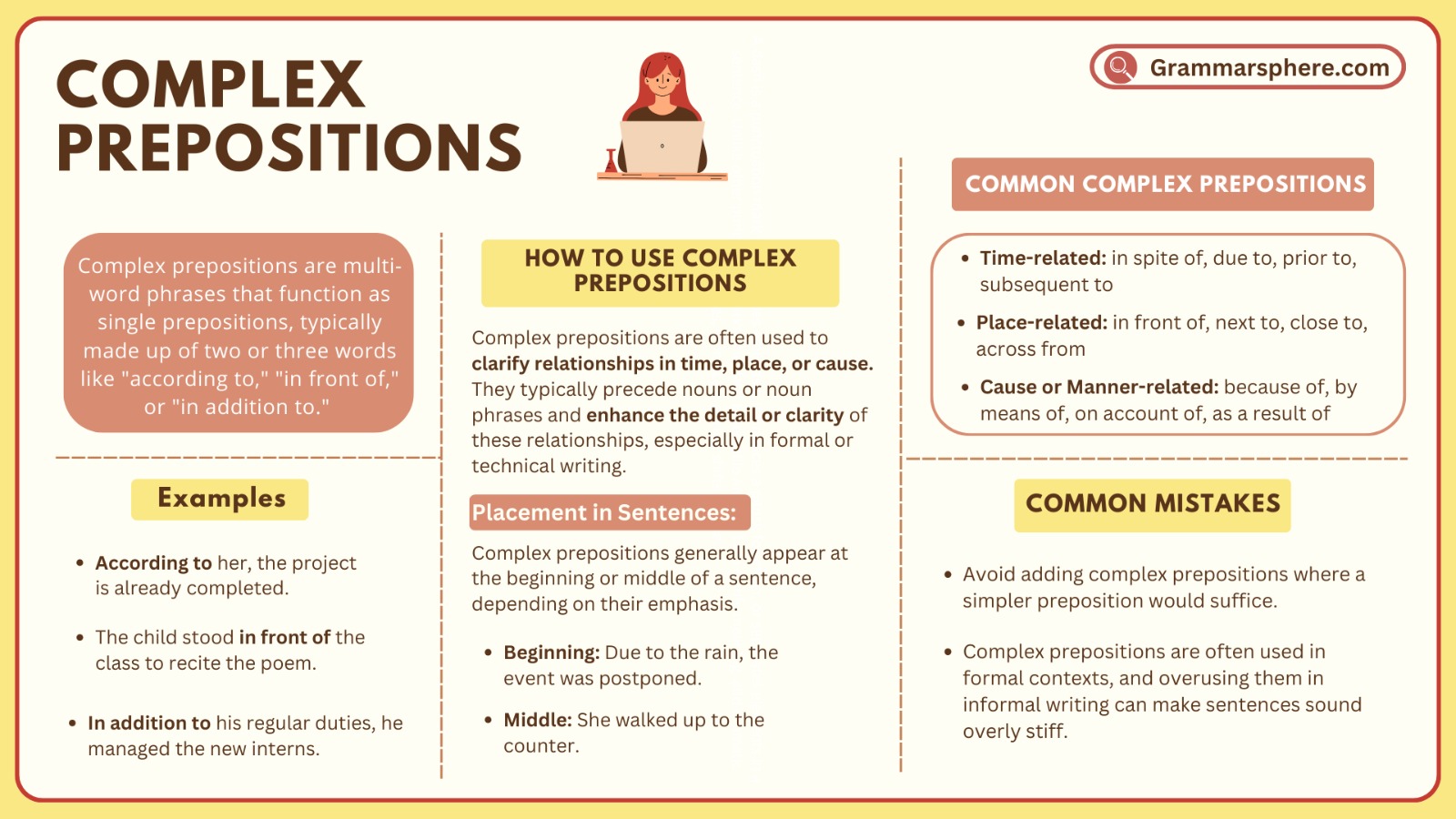
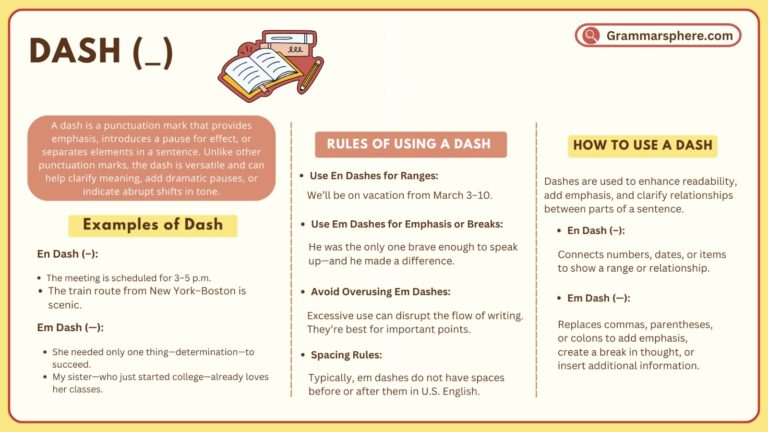
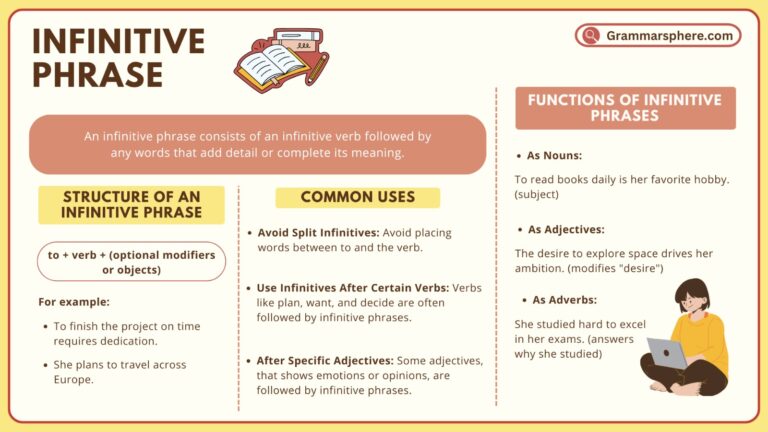
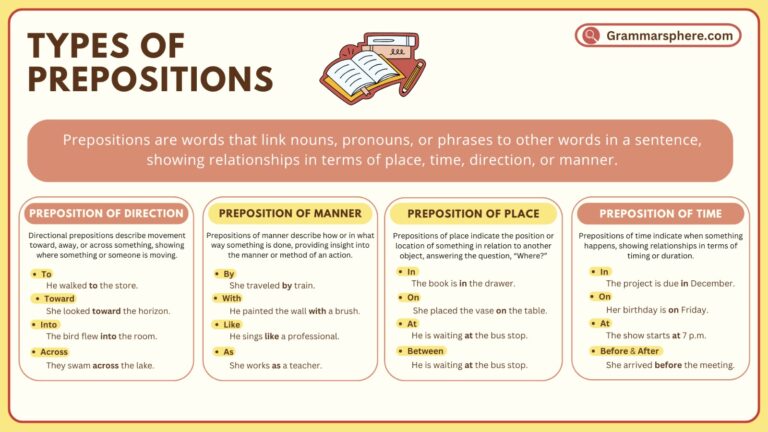
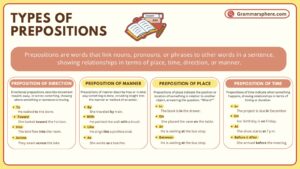
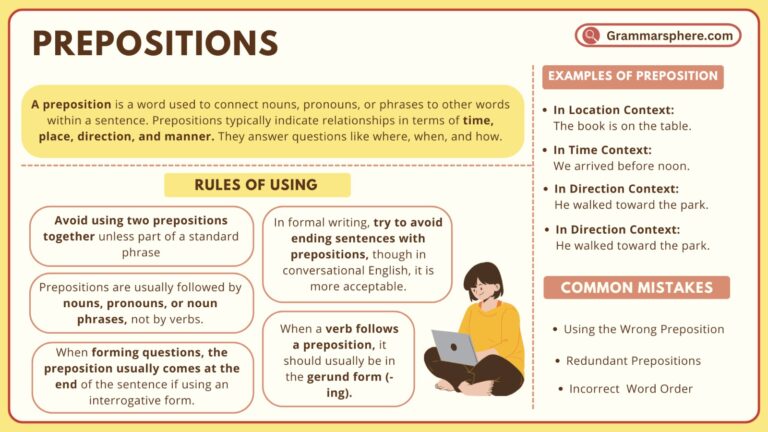
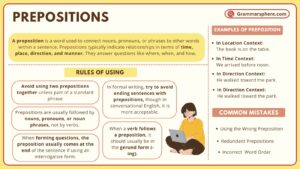
Leave a Comment